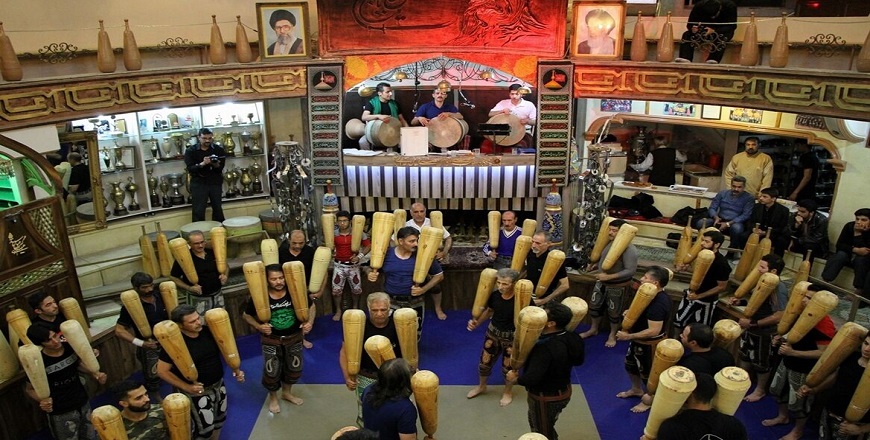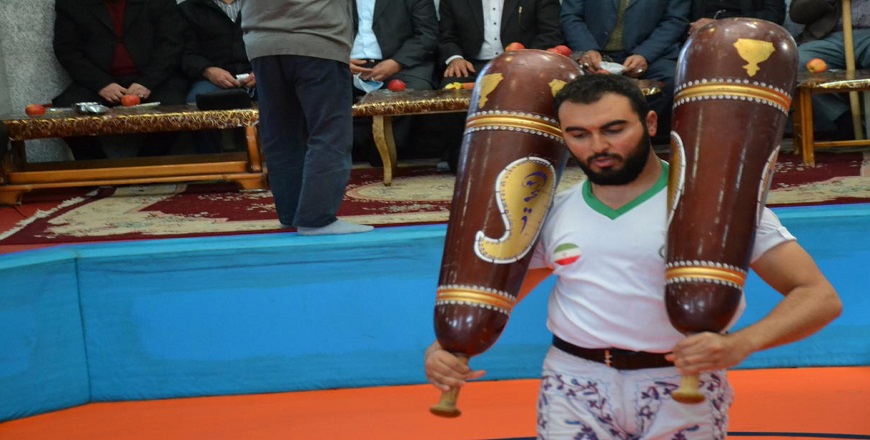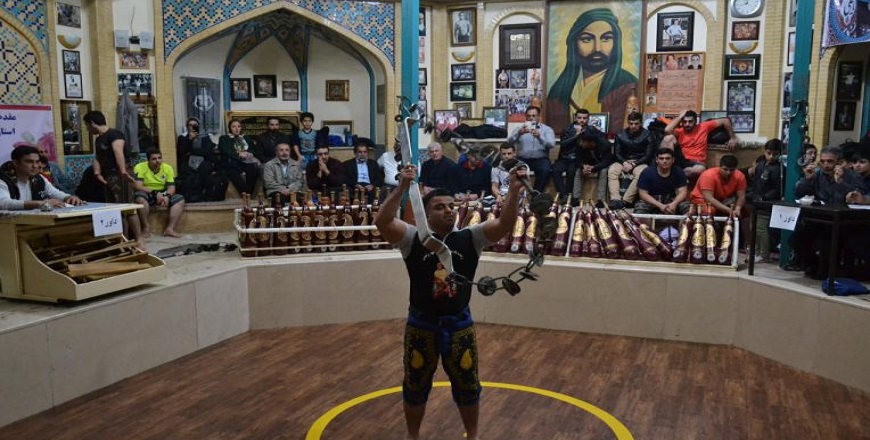

Senj: Weights
All the gymnasts take part in the exercises with the planks but the handling of the weights is reserved for the experienced men, the champions who are capable of exceptional endurance.
While the other athletes remain at their places in the pit, the one who has chosen the measure his strength with the ‘Senj’ lies down either directly on the ground or on a cotton fabric with broad red and black stripes and which is also used as a bathing cloth, the ‘long’. Sometimes this slight discomfort is eased by putting a little cushion under the head and another under the elbows.
These figures excite admiration for such exploits and the self mastery which they represent. Before beginning of the exercises, while the athlete is doing preparatory exercises to warm up, the ‘morshed’ chants an encouragement to great effort in a full voice: ‘In whatever thou doest invoke the name of Allah,
‘So that he may forgive thee all sins.
‘Seize the shield in thy hand and recite. And repeat again when thou hast breath:
‘There is no power or force save in the Lord.’
(Quotation from Quran)
‘Struggle, arm thy will
‘Thou shalt be uncomparable, fearless,
‘Rise up the shields
Then ‘morshed’ begins to count the duration of the champion’s efforts i.e. the number of times that he lifts the shields at arm’s length. Each one of these figures is followed by a religious incantation which is melodiously linked to the number so that it may be easily remembered. For example ‘Noh’: number 9, is followed by one of the names of the prophets of God for ‘Noh’ also means Noah. The mnemonic can also refer to an understood, but not stated number e.g ‘Splenour of Ali’ means ten. Here is the list of the implied numbers: ‘In the name of the Lord, merciful and just (first phase of Quran’
‘God is one
‘God is not two
‘Source of all beings
‘Four, refuge of the unfortunate
‘Five, victorious first of Khaybar (allusion to an episode in Mohammad’s struggle against idolaters when Ali, the son in law, took the fort of Khaybar not far from Medina).
Mil: Clubs

Formally the ‘mil’ were made of wood and ironlike maces, but today, they are cut of elm wood. They are characteristically symmetrical around the axis and bulge towards the top. There are two types of clubs: those reserved for training exercises and those for juggling. A pair of the first kind weigh from 5 to 40 kilograms and those for juggling from 4 to 6 kilograms. The handles of the heavy clubs are shorter than those of the juggling clubs. The work with the clubs is divided into three phases:
1- ‘Mil gereftan’ – the gymnasts take a pair of clubs from the edge of the pit where they have been neatly arranged and return to their places in the arena. The ‘meydandar’ who till now has led the game from the middle of the pit, suggests to each one of his companions to replace him. But normally this honor is declined and the ‘meydandar’ gives the signal to begin by placing the ‘mil’ in the hollow of his shoulder. Then the deep tone of the ‘morshed’s drum is heard while the club, held in the right hand, is calmly and solemnly raised. It describes a complete circle while turning on its axis, touching the shoulder blade, the flank and then the chest where it comes to a rest, while the other arm describes, in its turn, an identical movement. The movements which follow are the same but are quickened by the rhythm of the drum which pulses restlessly, imposing its infectious rhythm on the now warm muscles. The enthusiasm of the spectators is expressed at the end of the exercise when the ‘morshed’ once again asks them to intone the ‘salavat’
2- ‘Mil bazi’ – juggling. The masseur, who is also the servant at the ‘Zoorkhaneh’ brings a pair of light clubs to the veteran. He stands in the center of the pit and pronounces the following words loudly and clearly: ‘O lion of the desert of Najaf, Ali, would that thou couldst come to my aid! Perfection of Mohammad seal of the Prophets!’
3- Thanksgiving – then the veteran throws the clubs into the air, often high enough to touch the peacock feathers decorating the center of the dome. The dexterity of the jugglers is such that one does not have the impression that the clubs are thrown up and down but rather that they cleave the air, animated by some supernatural force. The ‘Salavat’ and all kinds of phrases of praise are pronounced by the ‘morshed’ hailing the performance:
‘Well done.
‘May thy arms become of bronze,
‘May the Lord grant thee the beautiful and the Good.
‘A thousand times bravo!
‘By the martyrs of the plains of Karbala.
The ringing of a bell followed by a thanksgiving, adds its metallic sound and the juggling ends in a burst of enthusiasm. The veteran thanks the narrator musician:
‘May the wrists of the ‘morshed’ never tire.
‘May God bestow on all health and wealth.
‘Charkhidan’ (Rotation):
The athletes stand in the pit with their arms folded on their chests and the masseur, ‘moshtemalchi’, throws a striped cotton bath – towel onto their backs. This they wrap around their torsos. One of the youngest then comes to the center after asking permission from the veteran. The ‘morshed’ beats out the special rotation rhythm on the drum. The exercise takes place in the following manner: four steps to the left and four to the right on tip toes until having gone right round the pit. Then the rotation begins: with arms stretched out horizontally the turner spins around, using his left foot as the pivot and his right foot as the spinning force. He continues until he is exhausted and at such speed that one sees only a silhouette spurred on by an almost supernatural force. The rotation has two phases: three turns on the spot and a fourth which is a jump into the air, all the while accompanied by a regular beating on the drum. The exercise demands finesse and precision and particularly holds the audience’s attention.
One by one the gymnasts come to the center of the pit and turn on the spot like whirling dervishes during their gatherings. The champion of champions ends this demonstration of lightness and subtleness with outstanding feats. He unrolls like a spindle from a fairy’s fingers.
This “Take-off” is of consummate skill implying complete control of the body with measured and perfect harmony. To spur on the turner the ‘morshed’ recites an ode of ‘Hafez’, the oracle of Shiraz the greatest lyric poet of Persia:
‘On the blue carpet the stars
‘Are chips of vivid silver.
‘I contemplated the Planet Mars
‘I scrutinized the New Moon.
‘Then I considered my life
‘The seeds that I had sown
‘I left the challenge
‘Of the sheaves of the harvests.
‘Looking back over the years,
‘I called upon my soul
‘In vain, Thou hast spoilt the best,
‘Wasted an ocean of thy life.
‘Thou must take the blame for thy sinful wantonness
‘A murmur rose, allusive answer:
‘Trace in thyself the image of the Creator.
‘Never despair, thy light
‘Shalt spread out like a jewel in a ring,
‘The sun, pinnacle of the stars
‘Dazzling in its multiple turns.
‘Pey Zadan’: Trepidation
The veteran ends his rotation by beating his feet. The gymnasts have now returned to their respective places and are about to imitate their leader in this new gymnastic movement. This is done in four phases: first step – jumping on one foot: one marked step; one Tabriz step (jumping alternately from the left on to the right foot); last step with feet together. These steps are the same as those with which the ‘shiists’ express their passionate exculpation. The gymnasts execute these steps to the accompaniment of the drum and the recitation of quatrains and mystic poems. In former schools, this repeated trepidation formed a part of the exercises for foot messengers.
‘Kabadeh’: The Bow

Work with the bow is the last exercise of the daily training of devotees of the ‘Zoorkhaneh’. The ‘Kabadeh’ is inspired from the former war bows and resembles it, in that the combat bows were composed of core of bone plates, reinforced with sinews and bent by means of a leather thong or sheep gut, whereas the exercise bow, the ‘Kabadeh’ is a rod of iron, widened in the center to form a hand grip. Here the thong is replaced by a chain, generally with sixteen links each containing six discs. The string of links is attached to an iron rod which is the grip. The bow is gripped with both hands, kissed as a sign of respect, then raised above the head at arms length and balanced to the rhythm of the drum. If a ‘Pishjkesvat’ who already has the title of ‘Master of the Bell’ and ‘Master of the Drum’, participates in this sport at the same time as other gymnasts, then the narrator musician rings the bell, while chanting epic hemistiches. Then the bow is shaken in all directions.
The bows weight 10 to 50 kilograms and the most experienced gymnasts work with the heavy bows while the novices use the lighter ones. Not content to vigorously shake their heavy and cumbersome instruments, they complete the movement by turning on the spot. Then they pass the chain around their necks, and, while completely letting go of the bow, turn once again dragging along the bow which descends, in this turning movement, from the shoulders down to the hips. Then the turner picks up speed and bends down in such a way that when the bow reaches his ankle he jumps over it by throwing himself sideways.
Koshti : Wrestling
There is a custom which demands that when a particularly solemn ceremony has been recognized, as we have seen by the sending of flowers ‘golrizan’, the usual exercises end in a boxing match. The champion leaves the pit after having kissed the ground, and the ‘morshed’ rings the bell and sounds the drum and then he requests a blessing on all those present. At this point one of the accomplished athletes stands in the middle of the pit and asks the veteran, ‘what shall we do?’. The latter replies: ‘Wrestle’. Two novices go to the center of the arena and face each other, their shoulders back and their chests thrust out. The one who addressed the veteran joins their hands and then stands next to the wrestler on the right and proclaims:
“As sweet as the locks of the beloved, so is the wrestling with its thousand turns and contortions,
“The flute is as the serpent, wrestling is a delight to the eye, its laws are sweet.
“Gripping one’s opponent according to the rules, is a delightful thing.”
He turns towards the other wrestler and, reminding him of the rules of wrestling, proclaims:
“O handsome young man with grip of steel
“In wrestling thou prepares thyself for war.”
Then he faces the ‘morshed’ and sings:
‘But on these conditions: First for the seal of Prophet, then for Ali the Great and thirdly for the champions living and dead, “salavat”. With one voice all give resounding thanks and the leader continues:
‘With blessing, reward of the master, the attraction to the soul of work well done, reward of the master from the expert hand (morshed) with the success of the Islamic religion’.
The two wrestlers press heavily against each other and grip each other thoroughly, but they stop, for at this moment a song is heard a “golkoshti’ – or literally a ‘flower of wrestling’.
The wrestlers attack each other, their bodies tide one to the other, they rock, grip, bend and stand up again. Complete silence reigns in the Zoorkhaneh. All that can be heard is panting of the protagonists, who with cat-like actions, move with the extreme precision of an oiled mechanism. The wrestling lasts for 10 minutes. The two men separate from each other at a signal given by the ‘morshed’ who throws a massaging towel to them. Immediately the wrestlers get up, kiss each other on the forehead and leave the pit.
“Moshtmal” : Massage
The masseur, ‘moshtmalchi’ throws a towel the ‘long’ at the feet of the gymnasts whom he massages one by one. Sometimes the athletes massage each other: they first bend forward placing their hands on their knees while the others massage them by gripping, and pressing the skin of their backs as hard as possible.
The novices massage their elders and the youngest ones are massaged by the masseurs of the ‘Zoorkhaneh’. The end of the massaging session is indicated when the athletes jump the air: the athletes do two or three somersault and come to land on exactly the same spot. Rope exercises can also terminate the session.
The athletes now go and put on their everyday cloths and one by one leave the ‘Zoorkhaneh’ with the same order of ceremony as at their arrival: thanksgiving, roll of the drum, ringing of the bell. While rapping his drum, the ‘morshed’ recites two mystic lines:
“The meeting is over, life draws to its close
“But we have remained at the beginning of Thy Creation (God).”
As much as the Persian language and literature, as the miniature and the beauties of Isfahan and Persepolis, it can be said that the ‘Zoorkhaneh’ is representative of a state of mind and of a civilization. At the time of Qajar Dynasty (1779-1925), social instability and historical circumstances were unfavorable to the Iranian people – except for the reign of Naser –al din Shah. This man who died at the beginning of the 20th century, made it his task to establish some conditions favorable for the development of the country. The ‘Zoorkhaneh ’never ceased to make its presence felt and made it possible for the Iranian people, with the help of champions who preserved the ancient sports, to maintain their ancestral tradition.